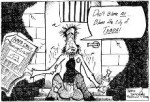USF must give grads adequate math background

Math courses are just plain tough. Sure, there are students who are able to do a little homework, not come to class and ace seemingly complex problems, but that hasn’t been my fate in life. Looking at the statistics of Americans’ math scores; I am not alone.
Thank globalization for exacerbating the difference in math ability between America and the world. Outsourcing has allowed for a vastly larger labor pool, and many in it just don’t have as many problems with those darn equations.
The Program for International Student Assessment found that out of 29 developed nations, American 15-year-olds were No. 24 in math literacy and problem solving. This issue even received attention during President George W. Bush’s State of the Union Address when he noted, “We need to encourage children to take more math and science and to make sure those courses are rigorous enough to compete with other nations.”
Alarmingly, this plague of math illiteracy is not isolated to younger students but is becoming apparent on college campuses. According to the U.S. Department of Education, fewer than half of all American high school graduates were prepared to take college-level math and science classes. As a result, USA Today reported, “Almost 20 percent of students pursuing four-year degrees had only basic quantitative skills.”
Certainly, USF must be providing the sort of rigorous quantitative instruction students need to succeed, right? Maybe not, as a recent experience taught me. A visit with a professor for a prospective graduate program found that while having more math courses than my degree requires at USF, I still need more to be ready for graduate school.
Such a realization raises the question: Why doesn’t USF require more math classes to earn a degree? Perhaps there is a fear that more rigorous math classes will cause students to shy away from those majors. But that isn’t necessarily a bad thing. USF should provide the roadmap to academic success and let students blaze a path or choose an alternative major. The University should not set students up for failure by not requiring classes that are known to be required in the future.
Now I realize that not every student is going to pursue a graduate degree, but that doesn’t mean the curricula should be watered down. In fact, even though graduates may swear they never want to grace the inside of the classroom again, they may someday decide they want an advanced degree. Better to get all the necessary knowledge the first time around.
I realize that many don’t share my major. It is true that economics has been described as the “dismal science.” But as William Stanley Jevons stated in the 19th century, “It is clear that economics, if it is to be a science at all, must be a mathematical science.” Thus, coursework devoid of the appropriate level of math is like studying chemistry only briefly after going over the periodic table or majoring in political science without consideration of the Cold War.
Another possibility when expanding math requirements in undergraduate curricula is that students may actually succeed. Raising the academic bar – providing tools such as cooperative learning opportunities and more graduate TAs to assist in major-specific math courses – could achieve surprising results.
What is evident is that USF is not alone in its math dilemma. Other undergraduate programs in my college also don’t require the level of math necessary for graduate work. The problem is that programs at other schools seem more proactive in indicating what courses students interested in graduate school should take. These are schools the USF administration should consider comparative in demographics.
The challenge of teaching math and making it understandable is a national problem with far-reaching implications for students’ future sustainability. The first steps need to be taken when students are young, but that does not excuse higher education from ensuring students have appropriate quantitative skills. No college student should graduate unable to balance a checkbook or devoid of the math background needed for graduate school.
Aaron Hill is a senior majoring in economics.





